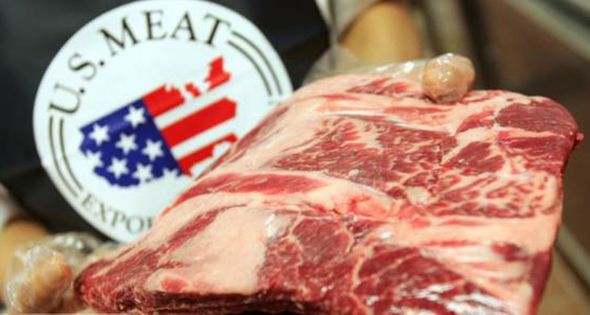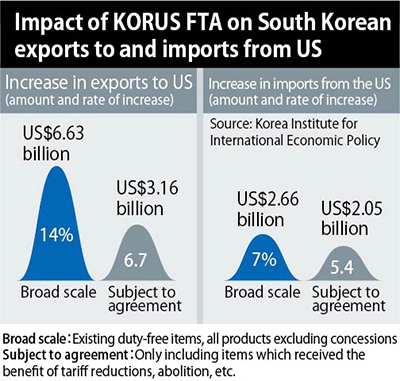 |
|
US beef imports being sold at a market
|
A MOTIE report found that domestic industries had lost almost $1 billion over five years
South Korea’s agriculture, livestock, and seafood industries suffered around one trillion won (about $1 billion) in production losses in the five years after the South Korea-US Free Trade Agreement (KORUS FTA) took effect, a report shows. An assessment report on post-FTA conditions submitted to the National Assembly by the Ministry of Trade, Industry and Energy on Apr. 9 showed US livestock product imports averaging US$7.3 billion per year over the five years from 2012 to 2016 after the FTA went into effect. The average was up by 14.8% from US$6.36 billion for the five years before the agreement (2007–2011). At the same time, South Korea’s average agriculture and livestock product exports to the US rose 46.7% from US$400 million before the FTA to US$590 million after it entered effect. The numbers show a higher rate of increase for South Korea’s exports, but a much larger increase for the US in actual dollar terms. According to the report, South Korean agriculture and livestock product fell by an average of 195.1 billion won (US$181.4 million) per year after the KORUS FTA, for a cumulative five-year total of 975.3 billion won (US$907.0 million). Domestic agricultural production fell by an estimated 0.44% per year as a result. Increased imports since the FTA were also found to have resulted in the loss of 5,407 jobs in the agriculture, livestock, and seafood industries. Of the three industries, the livestock sector, including beef and pork, suffered the biggest hit in terms of lost production over the five years after the KORUS FTA went into effect. Lost livestock production averaged 119.5 billion won (US$111.1 million) per year, or 61.2% of all farming losses. Pork in particular suffered average annual losses of 70.8 billion won (US$65.8 million), or 36.3% of all farming losses. “The relatively rapid lowering of tariffs on imported US pork appears to have had a large effect during the agreement’s implementation period,” the report concluded. Beef losses averaged 27.4 billion won (US$25.5 million) per year, or 14.1% of all farming losses. Soybeans and other beans suffered average annual losses of 24.0 billion won (US$22.3 million), or 12.3% of all farming losses. With beans subject to tariff-rate quotas (TRQs) in exchange for lower tariffs, the losses were seen as resulting from an increase in volumes that could be imported tariff-free into the South Korean market.
 |
|
Impact of KORUS FTA on South Korean exports to and imports from US
|







